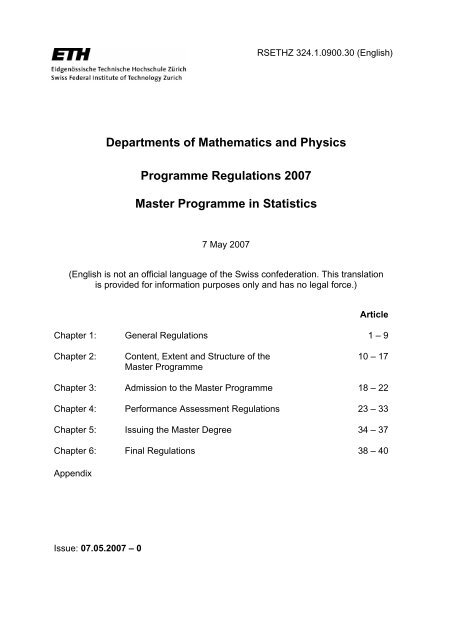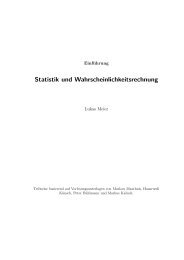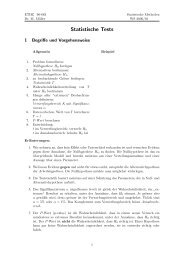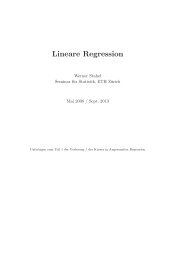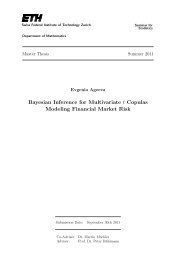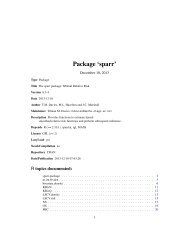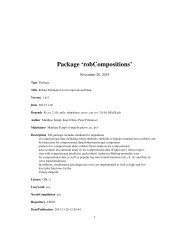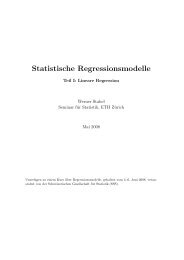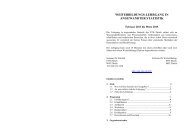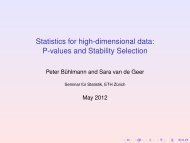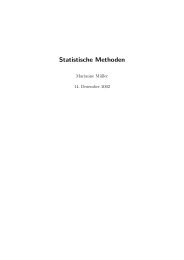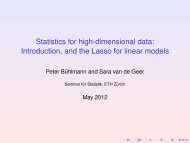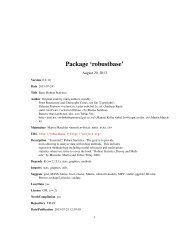MSc Muster-Reglement - Seminar für Statistik - ETH Zürich
MSc Muster-Reglement - Seminar für Statistik - ETH Zürich
MSc Muster-Reglement - Seminar für Statistik - ETH Zürich
Create successful ePaper yourself
Turn your PDF publications into a flip-book with our unique Google optimized e-Paper software.
RS<strong>ETH</strong>Z 324.1.0900.30 (English)Departments of Mathematics and PhysicsProgramme Regulations 2007Master Programme in Statistics7 May 2007(English is not an official language of the Swiss confederation. This translationis provided for information purposes only and has no legal force.)ArticleChapter 1: General Regulations 1 – 9Chapter 2:Content, Extent and Structure of theMaster Programme10 – 17Chapter 3: Admission to the Master Programme 18 – 22Chapter 4: Performance Assessment Regulations 23 – 33Chapter 5: Issuing the Master Degree 34 – 37Chapter 6: Final Regulations 38 – 40AppendixIssue: 07.05.2007 – 0
Departments of Mathematics and PhysicsProgramme Regulations 2007Master Programme in Statisticsof 7 May 2007(English is not an official language of the Swiss confederation. This translation isprovided for information purposes only and has no legal force.)____________________________________________________________________The <strong>ETH</strong> Zurich Executive Board,pursuant to Art. 4, Para. 1, Lit. a of the <strong>ETH</strong> Zurich Organisation Ordinanceof 16 December 2003 1 ,hereby decrees:Chapter 1:General RegulationsSection 1:GeneralArt. 1Subject-matter and Scope, Appendix1 These Programme Regulations determine the requirements under which the Masterdegree in Statistics can be acquired at the Departments of Mathematics and Physicsof <strong>ETH</strong> Zurich (hereafter referred to as D-MATH/D-PHYS).2 The Appendix is part of these Programme Regulations. Any modifications to theAppendix are decided by the Rector, upon the request of, or following a hearing withD-MATH/D-PHYS.Art. 2Academic Title1 The Master degree in Statistics entitles its holders to bear the following academictitle:Master of Science <strong>ETH</strong> in <strong>Statistik</strong>(abbreviated title: <strong>MSc</strong> <strong>ETH</strong> <strong>Statistik</strong>).2 The title in English is:Master of Science <strong>ETH</strong> in Statistics(abbreviated title: <strong>MSc</strong> <strong>ETH</strong> Statistics).3 Holders of this Master degree can also use the abbreviated title “<strong>MSc</strong> <strong>ETH</strong>”.1 RS<strong>ETH</strong>Z 201.021 (available in German only)1
Art. 3Legal BasisThese Programme Regulations are based on the following legal provisions:a. <strong>ETH</strong> Zurich General Ordinance on Performance Assessments of10 September 2002 2 (AVL <strong>ETH</strong>Z – acronym for German document);b. Ordinance on Admission to Studying at <strong>ETH</strong> Zurich of 10 September 2002 3(Zulassungsverordnung <strong>ETH</strong>Z).Art. 4Course CatalogueD-MATH/D-PHYS determine the Master programme courses for each semester,listing them in the course catalogue which is binding. This catalogue is submitted tothe Rector for approval within the period stipulated. Specific details are outlined inArt. 28 AVL <strong>ETH</strong>Z 4 and in the corresponding implementation provisions.Art. 5Language of Instruction1 Teaching is normally in English. The language used in any particular course isindicated in the course catalogue. Performance assessments are normally conductedin the language used in the course.2 Students may complete a performance assessment in English even if the assessmentis normally conducted in German. Students wishing to complete the assessmentin English must inform the responsible examiner in writing at the latest whenthey register for the assessment. Another language can be chosen by mutual agreement.2 SR 414.135.1, RS<strong>ETH</strong>Z 322.021 (available in German only)3 SR 414.131.52, RS<strong>ETH</strong>Z 310.5 (available in German only)4 SR 414.135.1, RS<strong>ETH</strong>Z 322.021 (available in German only)2
Chapter 2:Content, Extent and Structure of the MasterProgramme1. Abschnitt: Content of the Programme, Extent and DurationArt. 10Content of the Programme1 The Master programme in Statistics builds upon Bachelor programmes that includean introduction to basic mathematics. The programme imparts statistical conceptsand methods directed towards their application in science, technology and medicine.Scientific and methodological knowledge are complemented with elective courses ingeneral education in the field of Humanities, Social and Political Sciences.2 In the Master programme, students may select a specialisation area (major) todefine the main focus of their individual education. Details on specialisation areas arespecified in Art. 17.3 The programme concludes with a Master thesis. The Master degree enablesgraduates to enter the job market or to take up a doctoral programme.Art. 11Exent and Duration of the Programme, Limitation on the Duration ofStudies1 It is necessary to obtain 90 credits, as indicated under Art. 34, to acquire the Masterdegree. At least 60 of the required 90 credits must be acquired at <strong>ETH</strong> Zurich or at<strong>ETH</strong> Lausanne. Of these 60 credits, a minimum of 40, including the credits for theMaster thesis, must be acquired at <strong>ETH</strong> Zürich.2 The Master programme in Statistics is designed to be completed within one and ahalf years.3 The maximum duration of studies is three years. Upon request, the Rector canextend the duration of studies for compelling reasons.4 Should admission to the Master programme in Statistics be stipulated with the needto fulfil additional requirements, this entitles the extension of the maximum duration ofstudies as follows:– six months to acquire 21 – 30 additional credits;– one year to acquire 31 – 60 additional credits.Should less than 21 additional credits have to be acquired, the maximum duration ofstudies is not extended.4
Art. 12Study Guide, Study Procedure, Study Advisory Service1 D-MATH/D-PHYS provide a study guide to the Master programme in Statistics. Itcomprises an overview of the study programme.2 The student exchange advisor assists students with planning their course of study,in particular answering questions relating to study exchange.Art. 13Recognition of Study Achievements Acquired outside theMaster Programme1 The Director of Studies ultimately decides on the recognition of study achievementsacquired in other <strong>ETH</strong> Zurich study programmes or at other universities (e.g. studentexchange) during the Master programme. Performance evaluations are handled inaccordance with Art. 12 AVL <strong>ETH</strong>Z 6 .2 Study achievements that have already been recognised for a Bachelor or Masterdegree preceding the Master programme in Statistics are not recognised for theMaster degree in Statistics. 73 Study achievements acquired during the <strong>ETH</strong> Zurich programme Advanced Studiesin Applied Statistics are only recognised for the Master degree in Statistics:a. if no more than five years have elapsed between the study achievements andbeginning the Master programme; andb. if, according to Para. 2, recognition is not excluded.The recognition of credits leads to a corresponding reduction in the number of creditsrequired for the Master degree in Statistics.4 In accordance with the regulations specified in Para. 3, study achievementsacquired from other university advanced courses may also be recognised uponsubmission of a formal request. Such a request is assessed by the AdmissionsCommittee (see Art. 19). Reservation is made for the provisions of Art. 11, Para.1.Art. 14Student Exchange1 During the Master programme, students can acquire credits at other universities. Ofthese mobility credits, a maximum of 30 can be recognised to obtain the Masterdegree. Reservation is made for the provisions of Art. 11, Para.1. If requested by thestudent, any additional mobility credits are listed in the addendum to the finalacademic record.2 Credits for courses at other universities offered as part of the curriculum for theMaster programme in Statistics do not count as mobility credits.6 SR 414.135.1, RS<strong>ETH</strong>Z 322.0217 This also applies for degrees from non-tiered study programmes (diploma, licentiate).5
3 Students, who wish to spend an exchange semester at another university, must firstprepare a written study programme in collaboration with their student exchangeadvisor. This study programme specifies the study achievements to be acquired atthe host university and must be approved by the Director of Studies.Section 2:Subjects and Grouping according to CategoryArt. 15Grouping according to Category1 To acquire the Master degree, it is necessary to have study achievements in thefollowing categories. The minimum number of credits required in each category isindicated in Art. 34.a. Core Courses;b. Specialisation Areas (Majors) and Electives1. Statistical and Mathematical Courses,2. Courses in Application Areas;c. <strong>Seminar</strong> or Semester Paper;d. Compulsory Electives in Humanities, Social and Political Sciences;e. Master Thesis.2 D-MATH/D-PHYS specify in the course catalogue which courses are allocated toeach category as listed in Para. 1.Art. 16Category Overview1 Core Courses: They serve to impart knowledge in the basic concepts and methodsof Statistics. The core courses are grouped into several subject areas that are setdown in the course catalogue and, in addition, are listed in the Appendix to theseProgramme Regulations under Item 1.1. Further details on attending core coursesand performance assessments are specified in Art. 29.2 Specialisation Areas and Electives:a. Statistical and Mathematical Courses broaden and deepen knowledge ofBasic Statistics and how they are applied, or give insight into areas ofComputer Science, Numerics, Operation Research, Financial Mathematics,or Probability Theory. Details on performance assessments are specified inArt. 29.b. Courses in Application Areas allow students to deepen their knowledge inan application area of Statistics and to familiarise themselves with bothits specific problems as well as mathematical and statistical methods. Detailson attending these courses and performance assessments are specified inArt. 29.6
3 <strong>Seminar</strong> or Semester Paper:a. <strong>Seminar</strong>s deal with statistical methods and case studies to illustrate theirapplication. Usually, students make a formal presentation on the topics.Further details are specified in Art. 30.b. Semester Papers serve as an in-depth study of a statistical problem with itscorresponding methods, or to work on and clearly present a case study of astatistical evaluation. Further details are specified in Art. 30.4 Compulsory Electives in Humanities, Social and Political Sciences: Studentshave to choose courses from the general education courses in Humanities, Socialand Political Sciences (GESS). Further details are specified in the Rector’s directiveson GESS compulsory electives and in Art. 31 of these Programme Regulations.5 Master Thesis: It concludes the Master programme. By writing up the Masterthesis, students show their ability to independently produce a coherent and scientificpiece of work. Details are specified in Art. 32.Art. 17Specialisation Areas (Majors)1 The list of specialisation areas available is specified in the course catalogue.Furthermore, the specialisation areas are listed in the Appendix to these ProgrammeRegulations under Item 1.2.2 Students, who wish to take up a specialisation area and wish to have it printed ontheir degree certificate, must fulfil the following prerequisites:a. In the category Specialisation Areas and Electives, a minimum of 6 creditsmust be acquired in courses relating to the specialisation area chosen.b. The Master thesis must be written on a topic relating to the specialisation areachosen.3 D-MATH/D-PHYS verify that any prerequisites according to Para. 2 have beenfulfilled.4 Further details on the specialisation areas are specified in the Study Guide to theMaster programme in Statistics.7
Art. 20Entry into the Master Programme1 <strong>ETH</strong> Zurich students with a positive decision on admission can enrol for the Masterprogramme in Statistics once they only need to acquire the number of credits for theBachelor degree which subsequently allows them to enrol for the consecutive Masterprogramme in their own scientific discipline. 9 The following also applies:a. The regular dates and deadlines for enrolment at <strong>ETH</strong> Zurich are applicable.b. Admission is conditional if the Bachelor degree still has to be completed. Theadmission is revoked, if the Bachelor degree has not been acquired or cannot beacquired.2 Students, who have not studied at <strong>ETH</strong> Zurich and who hold a positive decision onadmission to the programme, can only enrol for the Master programme once theyhave obtained their degree.3 The Rector decides on any exceptions on the request of the Director of Studies.Art. 21Admission without Additional RequirementsAdmission to the Master programme in Statistics without having to fulfil additionalrequirements is normally only granted to applicants who hold a university degree andfulfil the prerequisites of Art. 18 as well as the requirement profile listed in theAppendix under Item 3.2.Art. 22Rejection of Admission1 Applicants with a university degree are not admitted to the Master programme inStatistics if they are required to take additional courses (additional requirements) ofmore than 10 credits.2 Applicants with a degree from a University of Applied Sciences are not admitted tothe Master programme in Statistics if they are required to take additional courses ofmore than 50 credits.3 The Rector decides on any exceptions on the request of the Director of Studies.9 The permitted number of credits still to be acquired is listed in the Programme Regulations of therelevant consecutive Master programme (e.g. for an <strong>ETH</strong> Bachelor in Biology the permitted number ofcredits still to be acquired is listed in the Programme Regulations for the Master in Biology).9
Chapter 4:Performance Assessment RegulationsSection 1:General RegulationsArt. 23Types of Performance Assessment, Performance Evaluation1 The Master programme in Statistics primarily involves the following types ofperformance assessment:a. examinations;b. written reports;c. presentations.2 Performance in an examination is graded. Other types of performance assessmentsare evaluated with a grade or with “passed/failed”.Art. 24Conditions of Admission to Performance Assessments1 Conditions of admission to performance assessments can be implemented. Theyare specified in the course catalogue should they not be specified in theseProgramme Regulations.2 D-MATH/D-PHYS verify that any conditions of admission to performance assessmentshave been fulfilled.Art. 25Registration for End-of-Semester Examinations and ExaminationSessions, Carrying out ExaminationsThe AVL <strong>ETH</strong>Z regulations 10 and the Rector’s directives apply with respect to registeringfor end-of-semester examinations and for examinations in the examinationsessions as well as carrying out examinations.Art. 26Registration for other Performance AssessmentsRegistration for performance assessments that do not come under Art. 25 is normallydone directly via the responsible examiner.10 SR 414.135.1, RS<strong>ETH</strong>Z 322.02110
Art. 27Performance Assessments for Additional Requirements1 Performance assessments for courses defined as additional requirements foradmission to the Master programme in Statistics can be grouped into examinationblocks. Any such examination blocks are to be specified in the admission decree.2 If no examination blocks are formed, an appropriate means of compensation is tobe provided should a performance assessment be failed twice.3 Should the additional requirements not be completely fulfilled due to the studenthaving failed a performance assessment twice, admission to the Master programmein Statistics is revoked. Should such candidates apply for a Bachelor programme at<strong>ETH</strong> Zurich and be admitted, the following rules are effective for performanceassessments already carried out to fulfil additional requirements:a. Performance assessments or examination blocks that have been passed canbe recognised in the Bachelor programme. Any recognised performanceassessments are allocated credits.b. No credits are allocated for performance assessments that have not beenpassed.c. The Rector decides on the recognition of credits upon the request of theresponsible department.Art. 28Dishonest BehaviourDetails on dealing with dishonest behaviour with respect to performance assessmentsare specified in the <strong>ETH</strong> Zurich Disciplinary Code of 2 November 2004 11 .11 SR 414.138.1, RS<strong>ETH</strong>Z 361.111
Section 2:Performance AssessmentsArt. 29Core Courses, Specialisation Areas and Electives1 Each course pertaining to the categories Core Courses and Specialisation Areasand Electives is evaluated with a performance assessment.2 The type and the timing of the performance assessments are specified in thecourse catalogue should the courses be offered by <strong>ETH</strong> Zurich. Should the course beoffered by another university, students are expected to inform themselves about theprocedures for the performance assessment at that particular university.3 The following also applies for the category Core Courses:a. In each subject area, one of the core courses totalling at least 3 credits mustbe successfully completed.b. If it is not possible to acquire the credits in one of the subject areas due tohaving failed the performance assessment twice or to the core courses havingalready been recognised for a previous Bachelor or Master degree 12 , theDirector of Studies decides on the appropriate means of compensation. Insuch cases, a reduction of the required number of credits for the Masterdegree is excluded.c. In each subject area, the core courses offered are normally mathematical aswell as application-oriented in content. For each subject area, only one ofthese is recognised for the Master degree.4 The following also applies for courses in application areas which belong to thecategory Specialisation Areas and Electives:a. Students list the courses they wish to select and submit their request to theDirector of Studies. The courses to be attended should normally be part ofonly one scientific subject area.b. For common subject areas, the study advisor of the Master programme inStatistics keeps a non-binding list of appropriate courses.Art. 30<strong>Seminar</strong> or Semester Paper1 Students participate in a seminar at which they make a presentation and hand outa written summary of their presentation.2 If it is not possible to make a presentation or, if the student wishes, a semesterpaper may alternatively be written up. The semester paper is supervised by either alecturer at <strong>ETH</strong> Zurich or an expert designated by the study advisor of the Masterprogramme in Statistics.12 This also applies for degrees from non-tiered study programmes (diploma, licentiate).12
Art. 31GESS Compulsory ElectivesEach course pertaining to the category GESS Compulsory Electives is evaluated witha performance assessment. The type and the timing of the performance assessmentsare specified by the <strong>ETH</strong> Zurich department or by the university offering thecourse.Art. 32Master Thesis1 Only students, who fulfil the following criteria, are allowed to write up their Masterthesis:a. They have successfully completed the Bachelor programme.b. They have fulfilled any additional requirements necessary to gain admission tothe Master programme in Statistics.c. They have acquired at least 16 credits in the category Core Courses.2 The Master thesis is normally supervised by a professor 13 or a Heinz Hopf Lecturer.3 The Director of Studies approves the topic, the supervisor, and the dates to beginand submit the Master thesis.4 The Master thesis is carried out over a period of five months and concludes with awritten report. Upon request, the Director of Studies can extend the duration of workfor compelling reasons. If the Christmas break coincides with the period during whichthe Master thesis is being carried out, the duration of work is automatically extendedby ten days.Art. 33Results and Repetition of Performance Assessments1 A performance assessment in the categories Core Courses, Specialisation Areasand Electives, and GESS Compulsory Electives, is considered as passed if it isgraded with at least 4 or as “passed”. A performance assessment considered asfailed can be repeated once provided that the university offering the performanceassessment does not have any other regulations about repeating performanceassessments.2 The performance achieved for the seminar or semester paper is evaluated with“passed” or “failed”. A seminar or semester paper considered as failed can berepeated once. If the seminar or the semester paper is repeated, a new topic must betreated.3 The Master thesis is evaluated with a grade. It is considered as passed if it isgraded with at least 4. A Master thesis considered as failed can be repeated once. Ifthe Master thesis is repeated, a new topic must be treated.13 The Master thesis can also be supervised by a retired professor during his/her first year of retirementonly.13
Chapter 5:Issuing the Master DegreeArt. 34Credits in each Category1 The 90 credits required to obtain a Master degree must be acquired in the followingcategories and subcategories in the minimum number indicated for each category.Further details are specified in Para. 2 – 4:a. Core Courses 20 creditsb. Specialisation Areas and Electives1. Statistical and Mathematical Courses(minimum 15 credits)2. Courses in Application Areas(minimum 10 credits)25 creditsc. <strong>Seminar</strong> or Semester Paper 4 creditsd. GESS Compulsory Electives 2 creditse. Master Thesis 30 creditsTotal81 credits2 The remaining credits to make up a total of 90 must be acquired in the categoriesaccording to Para. 1, Lit. a – d, whereby a maximum of 4 credits can be recognisedfor the category GESS Compulsory Electives3 Particular provisions specified in Art. 29, Para. 3 also apply to the category CoreCourses.4 Students, who wish to take up a specialisation area and have it printed on theirdegree certificate, must fulfil the prerequisites in Art. 17.Art. 35Request to Issue the Degree1 Once the requirements have been fulfilled in accordance with Art. 34, students canapply within three years after having begun the Master programme to be issued withthe Master degree. Upon request, the Rector can extend this time limit for compellingreasons.2 The application should indicate the performance assessments passed from thecategories specified in Art. 34, Para. 1 that should be listed in the final academicrecord. The total number of credits for each category or subcategory mustcorrespond to the minimum number of credits specified in Art. 34, Para. 1.3 A maximum of 100 credits are recognised for the Master degree. If requested bythe student, additional credits are listed in the addendum to the final academicrecord.14
Art. 36Interim Academic Record, Final Academic Record,Grade Point Average1 Interim academic records are generally issued at the end of the examinationsessions and contain any study performances evaluated since the last interimacademic record.2 The following are listed in the final academic record:a. The grades and other performance evaluations in accordance with Art. 35,Para. 2, and the grade point average calculated from the grades;b. Additional performance evaluations are listed in the addendum to the finalacademic record in accordance with Art. 35, Para. 3.3 The grade point average in the final academic record is calculated as a weightedmean of the individual grades with the credits as weights.4 D-MATH/D-PHYS record, manage and check the grades and other performanceevaluations, and issue the academic records.Art. 37Certificate, Diploma Supplement, Publication1 Graduates, who obtain the Master degree, receive a certificate and a diplomasupplement.2 If a specialisation area is chosen, and the prerequisites are fulfilled in accordancewith Art. 17, the specialisation area is printed as follows on the certificate:“Major in … (name of specialisation area)”.3 The Rectorate publishes the names of graduates who acquire a Master degree.15
Chapter 6:Final RegulationsArt. 38Exclusion from the Master ProgrammeExclusion from the Master programme in Statistics normally results from not beingable to acquire the required number of credits for the Master degree as indicated inArt. 34, due toa. having failed performance assessments twice; orb. having exceeded the allowed maximum duration of study.Art. 39Transcript of RecordsShould a student be excluded from the Master programme in Statistics before he/sheacquires the Master degree, or drops out of the study programme, he/she is given atranscript of records. This transcript lists all the evaluated study achievements carriedout before being excluded from or dropping out of the programme.Art. 40Effective DateThese Programme Regulations come into effect at the beginning of the autumnsemester 2007. These regulations are effective for students who begin the Masterprogramme on or after this date.On behalf of the <strong>ETH</strong> Zurich Executive BoardPresident a.i.: OsterwalderDelegate: Bretscher16
Appendixto the 2007 Programme Regulations for theMaster Programme in Statistics (D-MATH/D-PHYS)approved by the Rector on 7 May 2007___________________________________________________________________1. Core Courses and Specialisation Areas (Majors) available(Ref: Art. 16, Para. 1, and Art. 17 of the Programme Regulations)1.1 The Core Courses are grouped into the following subject areas:– Regression– Analysis of Variance and Design of Experiments– Multivariate Statistics– Time Series and Stochastic Processes– Mathematical Statistics1.2 Specialisation Areas (Majors) available:– Statistical Methodology– Applied Statistics– Biostatistics******************************************************************************************The required prerequisites to gain admission to the Master programme inStatistics are indicated below:– Items 2 und 3 specify the details for university graduates– Item 4 specifies the details for graduates from a University of AppliedSciences2. University degrees that qualify to apply for admission to the Masterprogramme in Statistics (= qualifying scientific disciplines)(Ref: Art. 18, Para. 1, Lit. a of the Programme Regulations)To be able to apply for admission to the Master programme in Statistics,candidates should hold a Bachelor degree corresponding to at least 180 ECTScredits or an equivalent university degree, in which basic mathematical knowledgehas been acquired. Bachelor degrees for the following scientificdisciplines normally fulfil the prerequisites (= qualifying scientific disciplines).1
The qualifying scientific disciplines for the Master programme in Statistics are, inparticular, the following (in alphabetic order):– Agricultural Science– Applied Biosciences– Biochemistry– Biology– Biotechnology– Chemical Engineering– Chemistry– Civil Engineering– Communication Systems– Computational Science and Engineering– Computer Science– Earth Sciences– Electrical Engineering Sciences (and Information Technology)– Environmental Engineering– Environmental Sciences– Food Science– Geomatic Engineering– Human Movement Sciences and Sports– Interdisciplinary Sciences– Materials Science– Mathematics– Micro Technology– Mechanical Engineering Sciences (and Process Engineering)– Pharmaceutical Sciences– Physics3. Knowledge required to gain admission to the Master programme inStatistics (requirement profile)(Ref: Art. 18, Para. 1, Lit. a of the Programme Regulations)3.1 The Admissions Committee for Statistics evaluates to what extent theapplicants’ previous education corresponds to the predefined requirementprofile (see Item 3.2). In particular, basic mathematical knowledge must beequivalent in content, scope and quality to the knowledge imparted during <strong>ETH</strong>Zurich Bachelor programmes in Natural Sciences or Engineering (see Part 2 ofthe requirement profile). For an overall evaluation, the Admissions Committeecan consider specific knowledge other than that indicated in the fields specifiedfor the requirement profile.Any lacking knowledge and practical experience must be compensated for byfulfilling additional requirements. If such requirements amount to more than 10credits, admission to the Master programme is not granted (see Art. 22 of theProgramme Regulations).2
3.2 The requirement profile is divided into the following two parts:Part 1 comprises scientific knowledge and practical experience imparted duringone of the study programmes listed in Item 2. This also includes amethodological, scientific way of thinking.Part 2 comprises basic mathematical knowledge including the fields ofProbability and Statistics amounting to 14 ECTS credits. Applicants’ previouslycompleted courses in Mathematics are evaluated according to the content ofthe courses listed below. The credits allocated serve as a benchmark for thescope of such courses. Details on the course content are specified in the <strong>ETH</strong>Zurich course catalogue (www.courses.ethz.ch).– Analysis 6 credits– Linear Algebra 3 credits– Computer Science and Numerics 2 credits– Probability and Statistics 3 credits4. Degrees from a University of Applied Sciences(Ref: Art. 18, Para. 1, Lit. a of the Programme Regulations)4.1 Application requirementsGraduates from a University of Applied Sciences (FH) can apply for admissionto the Master programme in Statistics, if they hold a Bachelor degree or adiploma in one of the scientific disciplines listed under Item 2 of this Appendix,and have thus acquired basic mathematical knowledge.4.2 Fulfilling the Requirement ProfileGraduates from a University of Applied Sciences can only fulfil the requirementprofile listed in Item 3.2 of this Appendix by carrying out additional requirementsamounting to 50 credits. These additional requirements have primarily to beacquired in the field of Mathematics, including the fields of Probability andStatistics, and in the areas of the graduates’ original scientific disciplines.The Statistics Admissions Committee can reduce the amount of additionalrequirements up to a maximum of 20 credits for very well qualified graduates.3


